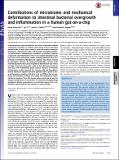Contributions of microbiome and mechanical deformation to intestinal bacterial overgrowth and inflammation in a human gut-on-a-chip
Author(s)
Kim, Hyun Jung; Li, Hu; Collins, James J.; Ingber, Donald E.
DownloadKim-2015-Contributions of mic.pdf (1.762Mb)
PUBLISHER_POLICY
Publisher Policy
Article is made available in accordance with the publisher's policy and may be subject to US copyright law. Please refer to the publisher's site for terms of use.
Terms of use
Metadata
Show full item recordAbstract
The main advance of this study is the development of a microengineered model of human intestinal inflammation and bacterial overgrowth that permits analysis of individual contributors to the pathophysiology of intestinal diseases, such as ileus and inflammatory bowel disease, over a period of weeks in vitro. By studying living human intestinal epithelium, with or without vascular and lymphatic endothelium, immune cells, and mechanical deformation, as well as living microbiome and pathogenic microbes, we identified previously unknown contributions of specific cytokines, mechanical motions, and microbiome to intestinal inflammation, bacterial overgrowth, and control of barrier function. We provide proof-of-principle to show that the microfluidic gut-on-a-chip device can be used to create human intestinal disease models and gain new insights into gut pathophysiology.
Date issued
2015-12Department
Institute for Medical Engineering and Science; Harvard University--MIT Division of Health Sciences and Technology; Massachusetts Institute of Technology. Department of Biological EngineeringJournal
Proceedings of the National Academy of Sciences of the United States of America
Publisher
National Academy of Sciences (U.S.)
Citation
Kim, Hyun Jung et al. “Contributions of Microbiome and Mechanical Deformation to Intestinal Bacterial Overgrowth and Inflammation in a Human Gut-on-a-Chip.” Proceedings of the National Academy of Sciences 113,1 (January 2016): E7–E15. © 2017 National Academy of Sciences
Version: Final published version
ISSN
0027-8424
1091-6490